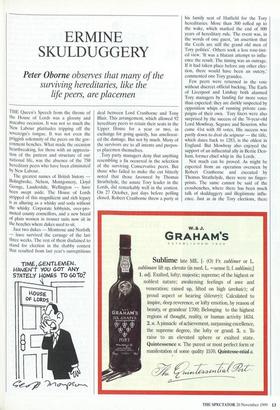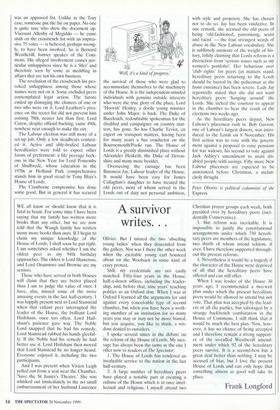ERMINE SKULDUGGERY
Peter Oborne observes that many of the surviving hereditaries, like the life peers, are placemen
THE Queen's Speech from the throne of the House of Lords was a gloomy and macabre occasion. It was not so much the New Labour platitudes tripping off the sovereign's tongue. It was not even the Priggish solemnity of the peers on the gov- ernment benches. What made the occasion heartbreaking, for those with an apprecia- tion of the pattern and structure of our national life, was the absence of the 750 hereditary peers who have been eliminated by New Labour.
The greatest names of British history Bolingbroke, Nelson, Montgomery, Lloyd George, Lauderdale, Wellington — have been swept aside. The House of Lords Stripped of this magnificent and rich legacy is as alluring as a whisky and soda without the whisky. Corporate lobbyists, over-pro- moted county councillors, and a new breed of plain women in trouser suits now sit in the benches where dukes used to sit.
Just two dukes — Montrose and Norfolk — have survived the carnage of the last three weeks. The rest of them disdained to stand for election in the shabby contest that resulted from last year's surreptitious
TIME, GENTLEMEN. HAVEN'T YOU GOT ANY STATELY HOMES TO GO TO?
deal between Lord Cranborne and Tony Blair. This arrangement, which allowed 92 hereditary peers to retain their seats in the Upper House for a year or two, in exchange for going quietly, has ameliorat- ed the damage. But not by much. Many of the survivors are to all intents and purpos- es placemen themselves.
Tory party managers deny that anything resembling a fix occurred in the selection of the surviving Conservative peers. But those who failed to make the cut bitterly noted that those favoured by Thomas Strathclyde, the astute Tory leader in the Lords, did remarkably well in the contest. On 27 October, just days before polling closed, Robert Cranborne threw a party at his family seat of Hatfield for the Tory hereditaries. More than 300 rolled up to the wake, which marked the end of 800 years of hereditary rule. The event was, in the words of one guest, 'an assertion that the Cecils are still the grand old men of Tory politics'. Others took a less rose-tint- ed view. 'It was a blatant attempt to influ- ence the result. The timing was an outrage. If it had taken place before any other elec- tion, there would have been an outcry,' commented one Tory grandee.
Few peers were returned in the vote without discreet official backing. The Earls of Liverpool and Lindsay both alarmed Tory managers by landing far more votes than expected: they are darkly suspected by opposition whips of running private cam- paigns of their own. Tory fixers were also surprised by the success of the 76-year-old Lord Mowbray, Segrave and Stourton, who came 41st with 88 votes. His success was partly down to droll du seigneur— the title, which dates back to 1283, is the oldest in England. But Mowbray also enjoyed the support of an influential ally in Bertie Den- ham, former chief whip in the Lords.
Not much can be proved. As might be expected from an operation overseen by Robert Cranborne and executed by Thomas Strathclyde, there were no finger- prints. The same cannot be said of the crossbenches, where there has been much talk of skulduggery and illegitimate influ- ence. Just as in the Tory elections, there was an approved list. Unlike in the Tory case, someone put the list on paper. No one is quite sure who drew the document up. Viscount Allenby of Megiddo — he came sixth on the crossbench list with an impres- sive 75 votes — is believed, perhaps wrong- ly, to have been involved. So is Bernard Weatherill, former speaker of the Com- mons. His alleged involvement causes par- ticular unhappiness since he is a 'lifer' and therefore seen by some as meddling in affairs that are not his own business.
The revelation of the crossbench list pro- voked unhappiness among those whose names were not on it. Some excluded peers contemplated legal action. The furore ended up damaging the chances of one or two who were on it. Lord Leathers's pres- ence on the secret list did not prevent him coming 70th, nearer last than first. Lord Carew, despite official backing, came 49th, nowhere near enough to make the cut.
The Labour election was still more of a set-up job. Only a few deadbeats contest- ed it. Active and able-bodied Labour hereditaries were told to expect other forms of preferment: a life peerage beck- ons in the New Year for Lord Ponsonby of Shulbrede, whose education in the 1970s at Holland Park comprehensive stands him in good stead in Tony Blair's House of Lords.
The Cranborne compromise has done some good. But in general it has secured 'Well, it's a kind of progress.'
the survival of those who were glad to accommodate themselves to the machinery of the House. It is the independent-minded individuals with genuine outside interests who were the true glory of the place. Lord 'Hoorah' Henley, a docile young minister under John Major, is back. The Duke of Buccleuch, redoubtable spokesman for the disabled and campaigner on country mat- ters, has gone. So has Charlie Teviot, an expert on transport matters, having been for many years a bus conductor on the Bournemouth/Poole run. The House of Lords is a greatly diminished place without Alexander Hesketh, the Duke of Devon- shire and many more besides.
Overseeing the carnage has been Baroness Jay, Labour leader of the House. It would have been easy for James Callaghan's daughter to have treated the old peers, most of whom served in the Lords out of duty not personal ambition, with style and propriety. She has chosen not to do so. Jay has been vindictive. In one remark, she accused the old peers of being 'old-fashioned, patronising, sexist and racist' — the four strongest words of abuse in the New Labour vocabulary. Shc is sublimely unaware of the weight of his- tory, loftily claiming that Lords reform is a distraction from 'serious issues such as my women's portfolio'. Her behaviour over 'club rights' for peers (as matters stand, hereditary peers returning to the Lords should he barred by the policeman at the front entrance) has been severe. Lady Jay reportedly stated that she did not want hereditary peers 'hanging around' the Lords. She lacked the courtesy to appear in the chamber to hear the result of the elections two weeks ago.
As the hereditary peers depart, New Labour's placemen rush in. Bob Gavron, one of Labour's largest donors, was intro- duced to the Lords on 8 November. His first action was to vote with the govern- ment against a proposal to raise pensions for war widows; his second to vote against Jack Ashley's amendment to assist dis- abled people with savings. Fifty more New Labour placemen are expected to be announced before Christmas, a melan- choly thought.
Peter Obome is political columnist of the Express



























































































 Previous page
Previous page